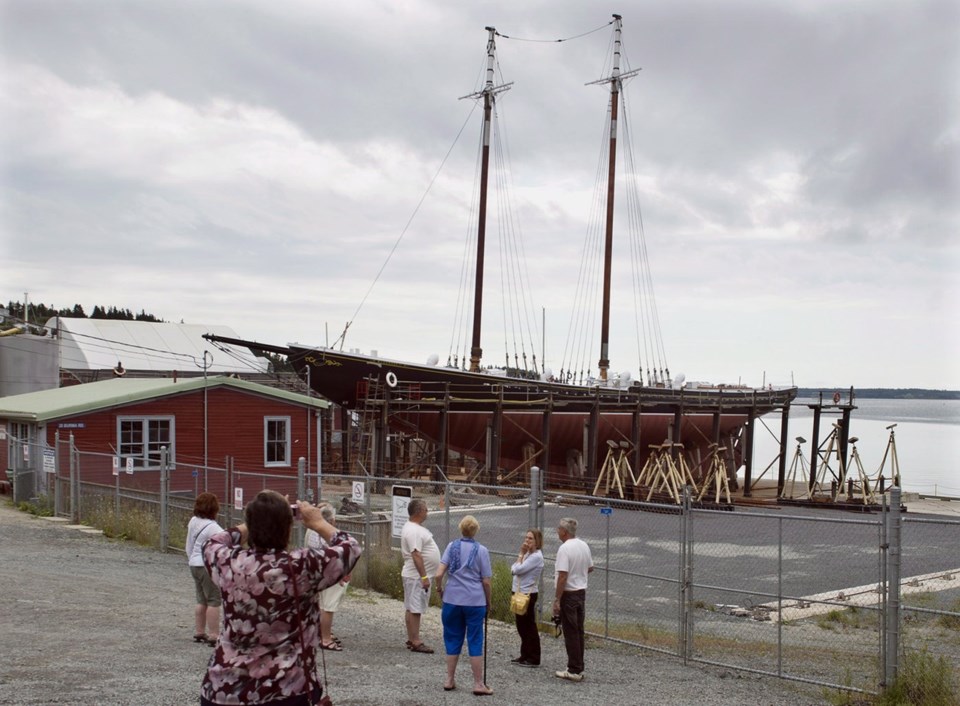HALIFAX — A First Nation in Nova Scotia is purchasing two shipyards in the province, saying the acquisitions will position the band to compete for federal contracts, including those from the Defence Department.
The Glooscap First Nation recently announced it had reached an agreement in principle to acquire a majority stake in the B. Boutilier Group of Companies, which currently owns the historic Lunenburg Shipyard and the nearby East River Shipyard.
“This acquisition … underscores the strength and resilience of our Mi’kmaq community and is a step forward in our journey towards economic autonomy and self-determination,” Glooscap First Nation Chief Sidney Peters said in a statement.
The Mi'kmaq band says it plans to establish a subsidiary called Glooscap Defence, which will focus on making the band the largest Indigenous defence contractor in Canada.
Glooscap Ventures, the investment arm of Glooscap First Nation, wants to take advantage of a federal procurement strategy that will eventually require all departments to ensure at least five per cent of all contracts are held by Indigenous businesses.
Michael Peters, CEO of Glooscap Ventures, declined to disclose details of the pending deal, which is expected to close this fall.
"We're looking forward to jumping into the shipbuilding and ship repair business," Peters said in an interview Friday. "We know there are a lot of opportunities in government procurement in defence and marine security, particularly the coast guard."
Under the agreement in principle, Bradison Boutilier, founder of B. Boutilier Group, will retain a significant ownership stake in the new corporation and remain at the helm.
"We are excited to partner with Glooscap First Nation in supporting Canada's defence industry while also upholding our tradition of service quality and community engagement across existing, non-defence operations," Boutilier said in a statement.
Both shipyards are on the province's south shore and offer services to the commercial and recreational boating markets, including storage, repair and fabrication. Neither shipyard is currently building vessels.
But Peters said the band is already thinking about building boats for its own fishing fleet and getting involved in offshore energy projects.
"We are going into growth mode, which includes upgrading facilities to do repair work and to start building at some point," he said. "We're not in a position to do anything large."
Based on the east side of Mahone Bay, East River Shipyard Ltd. was founded by Boutilier in 2020. He says it has the largest full-service marine yard in Atlantic Canada.
Lunenburg Shipyard Ltd. was founded in 1897 to service a fleet of Grand Banks schooners. The legendary schooners Bluenose and Bluenose II were built at the adjacent Smith and Rhuland Shipyard, which closed in 2005. But it was the Lunenburg Shipyard Alliance that rebuilt the Bluenose II between 2010 and 2012.
Glooscap First Nation can be found halfway between the Nova Scotia towns of Wolfville and Windsor. It has 436 registered members, about 100 of which live off reserve, according to federal statistics.
"We definitely are small, but we believe we're pretty mighty," Peters said, adding that the First Nation is Nova Scotia's third-smallest band by population.
"We hit above our weight. The chief and council really put a lot of effort and trust into economic development."
Glooscap Ventures oversees several businesses in retail, seafood, renewable energy and consulting. Glooscap Seafood, for example, has divisions in harvesting, processing and sales of lobster, tuna and clams. Glooscap Energy is involved in solar and wind power projects.
This report by The Canadian Press was first published June 7, 2024.
Michael MacDonald, The Canadian Press



